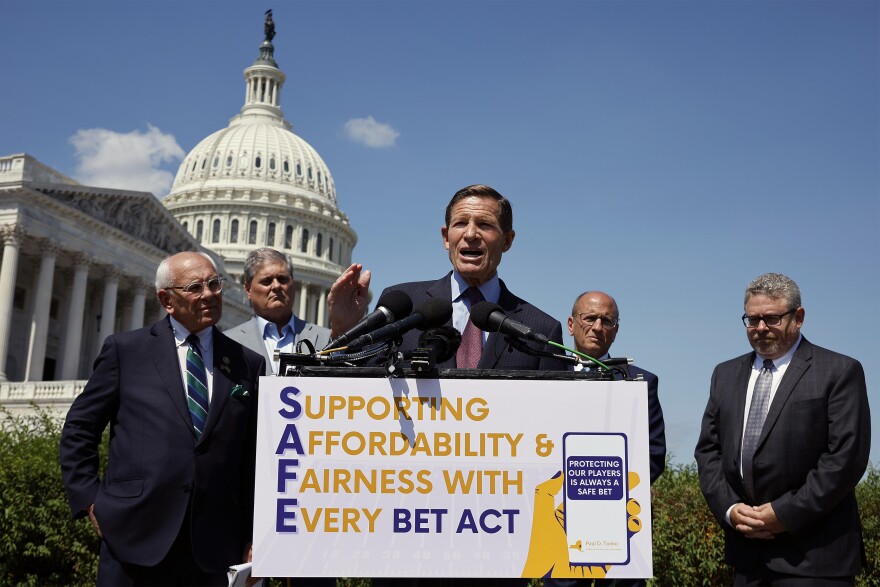The federal government would ban in-game advertising and bets on college athletes under a sports betting regulation bill proposed by two northeastern legislators.
Rep. Paul Tonko of New York and Sen. Richard Blumenthal of Connecticut introduced the bill Thursday. It's designed to address what they say are the harmful effects of the rapid expansion of legal sports betting in the U.S. since 2018.
The measure also would forbid the use of credit cards to fund online gambling accounts.
The Democratic legislators say sports betting, now legal in 38 states plus the District of Columbia, has increased gambling addiction and other problems. Every moment of every game is a chance to gamble, Tonko said.
“That’s resulted in a frightening rise in gambling disorder, which has in turn enacted a horrific toll on individuals, many of whom have lost their home, job, marriage, and their lives," Tonko said.
Blumenthal called the measure a matter of public health.
“It is a matter of stopping addiction, saving lives, and making sure that young people particularly are protected against exploitation,” Blumenthal said.
The legislation already faces strong opposition from the gambling industry, which has said for years that it should self-regulate sports betting advertising to avoid the federal government imposing standards on it.
The American Gaming Association, the gambling industry's national trade association, said sports books already operate under government supervision, contribute billions of dollars in state taxes, and offer consumers protections that don't exist with illegal gambling operations.
“Six years into legal sports betting, introducing heavy-handed federal prohibitions is a slap in the face to state legislatures and gaming regulators who have dedicated countless time and resources to developing thoughtful frameworks unique to their jurisdictions,” it said in a statement.
The industry has adopted sports betting practices that include some limits on advertising, but critics say they don't go far enough.
Harry Levant, director of gambling policy at the Public Health Advocacy Institute at Northeastern University School of Law, compared gambling to drugs and alcohol in terms of potential addictiveness.
“With every other addictive product or substance, the government regulates the advertising, promotion, distribution, and consumption of the product,” he said. “With gambling, sadly, the exact opposite is occurring.”
The National Council on Problem Gambling says “gambling problems may increase as sports gambling grows explosively” across America.
The bill would prohibit operators from accepting more than five deposits from a customer over a 24-hour period, and check on a customer's ability to afford depositing more than $1,000 in 24 hours or $10,000 in a month.
The bill also would ban “prop” bets on the performance of college or amateur athletes, such as how many passing yards a quarterback will rack up during a game.
And it would prohibit the use of artificial intelligence to track a customer's gambling habits or to create gambling products including highly specific “micro-bets," which are based on scenarios as narrow as the speed of the next pitch in a baseball game.





